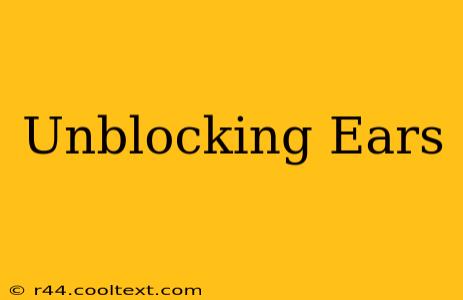Feeling that annoying fullness or pressure in your ears? You're not alone. Many people experience ear blockage at some point, and understanding the causes and effective relief methods is crucial. This comprehensive guide will explore various reasons why your ears might feel blocked, offer home remedies for relief, and explain when it's time to seek professional medical attention.
Common Causes of Blocked Ears
Several factors can contribute to that unpleasant sensation of blocked ears. Let's delve into the most prevalent causes:
1. Earwax Buildup (Cerumen Impaction):
Earwax, or cerumen, is a natural substance produced by your ears to protect them from infection and debris. However, excessive buildup can lead to a feeling of fullness or muffled hearing. This is a very common cause of blocked ears.
2. Changes in Air Pressure:
Fluctuations in air pressure, such as during air travel (airplane ears) or scuba diving, can create a vacuum effect in the middle ear, causing discomfort and a sense of blockage. This is often accompanied by pain.
3. Eustachian Tube Dysfunction:
The Eustachian tube connects the middle ear to the back of the throat. If this tube becomes inflamed or blocked (often due to allergies, a cold, or the flu), it can prevent proper pressure equalization, resulting in a blocked feeling. Eustachian tube dysfunction is a frequent culprit.
4. Allergies:
Allergic reactions can inflame the mucous membranes in the nose and throat, impacting the Eustachian tubes and leading to ear blockage. Seasonal allergies or reactions to specific allergens can trigger this issue. Knowing your allergies is important.
5. Infections:
Ear infections, particularly middle ear infections (otitis media), can cause significant pressure and blockage. These infections are often accompanied by pain, fever, and reduced hearing.
6. Fluid Buildup:
Excess fluid in the middle ear, often related to infections or allergies, can also contribute to a feeling of blocked ears. This fluid can hinder the transmission of sound waves.
Home Remedies for Unblocking Ears
Before resorting to medical intervention, several home remedies might provide relief:
- Yawning or Swallowing: These actions help open the Eustachian tubes, equalizing pressure and potentially relieving blockage.
- Valsalva Maneuver: This involves gently pinching your nose closed, closing your mouth, and attempting to exhale forcefully. Caution: Use this method cautiously as excessive pressure can be harmful.
- Over-the-Counter (OTC) Medications: Decongestants (for allergies or colds) and pain relievers (for pain associated with infections) may help alleviate symptoms. Always follow product instructions. However, never use ear drops unless explicitly instructed by a doctor.
- Warm Compress: Applying a warm compress to the affected ear can help soothe discomfort and potentially reduce inflammation.
When to See a Doctor
While many cases of blocked ears resolve on their own or with home remedies, it's crucial to seek medical attention if:
- You experience severe pain.
- You have a fever.
- Your hearing loss is significant or persistent.
- You have drainage from your ear.
- Symptoms persist for more than a few days.
- You suspect a serious infection.
A doctor can diagnose the underlying cause of your blocked ears and recommend appropriate treatment, which may include medication, ear irrigation, or other procedures.
Disclaimer: This information is for general knowledge and does not constitute medical advice. Always consult a healthcare professional for any health concerns.

